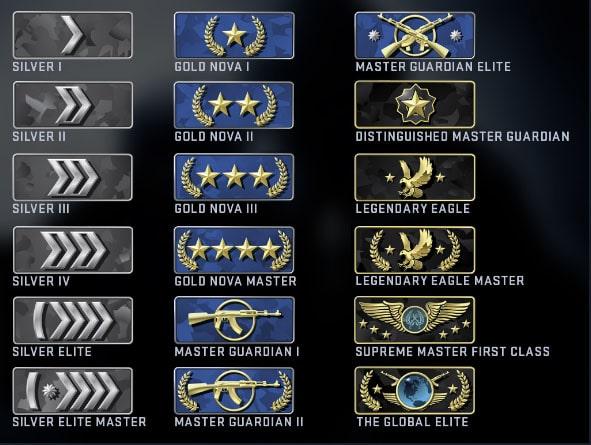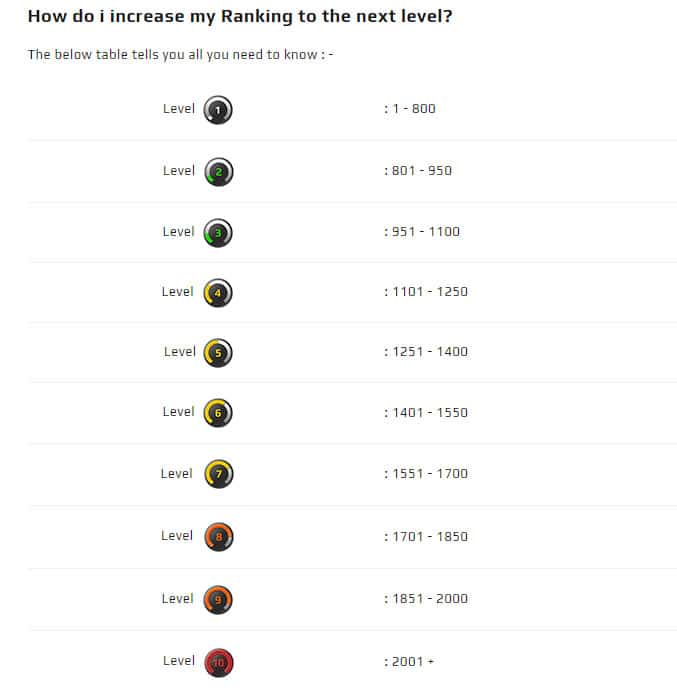For all players new to CSGO, and even longtime players, this article will provide a clear and simple explanation of how the CSGO ranking system works. Most CSGO players are probably somewhat familiar with ELO-based matchmaking systems but might not be aware of how the CSGO ranking system differs.
If you are an absolute beginner, then upon winning 10 competitive matches, you will receive your first rank. There are 18 different ranks beginning at ‘Silver 1’ and ending at ‘The Global Elite’. Depending on your performance in these placement matches, you will be placed somewhere between these ranks. Players do not automatically start at ‘Silver 1’, and if you’re competent at FPS games, your first rank might be somewhere in the middle.
Basic ELO System Explained
A simple explanation of an ELO system outlines a process by which two players can compete against each other and will gain or lose rating depending on the outcome of the match. The comparison between each player’s rating determines the probable outcome. For example, if both players have the same rating, then each player would have a 50% probability to win.
Another example: Player 1 has a rating of 1500, and Player 2 has a rating of 1700. Suppose that when they compete, Player 1 has a 70% probability to win, and Player 2 only has a 30% probability to win. After the match, each player will gain or lose rating depending on the probability they had to win. In this example, Player 1 might have had a payoff of +30/-70 rating going into this match.
This system is also used in team games consisting of multiple players. The total rating for each team is made up by adding up all the players’ ratings together. A system like this is used in the third-party matching system FACEIT. You can all see the values, and you are aware of how much ELO rating you will gain or lose. Another thing to note is that only the final outcome matters. Whether you won or lost, it doesn’t matter by how much or how little.
How The CSGO Ranking System Differs
One of the first differences (and perhaps why there is confusion over the topic) is that the CSGO ranking system uses a hidden rating. You’re never aware of how close or how far you are from your next rank, and it’s difficult to track your progress.
The most significant difference, however, is the fact that it’s not just the final result that matters (winning or losing.) It matters by how much you win or lose.
At the beginning of the match, the expected outcome is calculated. This is based on the combined total of each team’s ratings. If the expected outcome is achieved, no one will gain or lose any rating. Everyone performed as expected, and their rating represents their skill level.
Example 1:
A fairly evenly matched game, Team 1 has slightly higher ranks (and higher hidden rating). The expected outcome of the match is that Team 1 wins the game with a score of 16:13. The game ends 16:13, as expected, and no one gains or loses any rating.
In this example, if Team 1 won the game 16:8 – they achieved above the expected result and will gain rating.
Example 2:
A bunch of silvers somehow get matched against five ‘Global Elites’. The expected outcome is calculated and the ‘Globals’ are expected to win 16:0. The match ends 16:3, as the silvers scraped together 3 rounds. So even though they lost the game, and quite convincingly, they still gained rating.
In these extreme situations, it can be counter-intuitive. It is possible to rank up on losses and de-rank on wins. There is plenty of evidence to support this, and I myself have ranked up after tying a game. It is uncommon though, as the matchmaking system will try to match players of similar ranks together. The matchmaking system will attempt to achieve expected outcomes of 15:15 whenever possible.
Valve has vaguely hinted that getting MVP stars has some small impact on how much rating you will get. It is hypothesized that this may have to do with how the total rating that your team receives gets distributed. In my experience, this has not been a significant factor.
Some Key Points
- Your score and K/D doesn’t have any impact (In terms of your score, only the MVP stars matter, for whatever reason Valve has decided).
- Try and win as many rounds as you can, even if you don’t win the match. Every round matters.
- Stop complaining that you have won 20 games and not ranked up. You might have just been achieving the expected result in every game.
- Don’t worry too much about losing to players with way higher ranks; you probably didn’t lose too much rating.



